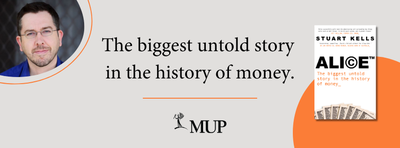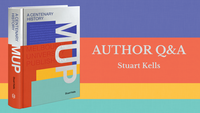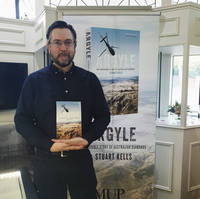Stuart Kells on ABC Nightlife
Read the full conversation between Stuart Kells and ABC's Philip Clark discussing Alice™

The ABC’s Philip Clark interviewed Stuart Kells, author of Alice™. They examined how money and banking really work, and whether the financial system serves the public interest. Or rather, do the biggest banks control the system in ways that serve the banks, which earn risk-free profits and take uncapped gambles that put the global financial system at risk?
Philip Clark:
Do you remember this scene from the classic film from 1946 It’s a Wonderful Life? Depositors wanted their money from a small town building society. James Stewart played the manager, and he explained what happens to your money when you put it into a bank.
‘The money’s not there,’ Bailey pleads. ‘Your money’s in Joe’s house … and in the Kennedy house, and Mrs Macklin’s house, and a hundred others.’
That idea that there is a circular flow of money – that banks lend what they gather as deposits, keeping just a fraction of it as reserves – is known as ‘fractional reserve banking’, and it is often taken as a self-evident truth, the foundation of modern finance.
But what if modern finance doesn’t work like that? What if a person’s deposit account is a liability for your bank and, as a depositor, you are no more than one among many of the bank’s unsecured creditors, and where in a crisis, private banks’ promises could be worth as little as nothing at all?
Well Stuart Kells, author and Adjunct Professor at La Trobe University’s College of Arts, Social Sciences and Commerce, has taken a good close look at how money and banking works, for his new book Alice: The biggest untold story in the history of money, and he thinks we should all really be thinking again about our concept of money.
He has spent many hours with financial inventor Ian Shepherd, digging into the financial basement, getting his head around inter-bank payment systems, foreign exchange settlement arrangements, the fine print of derivatives contracts, and the normally unseen workings of banks and trading platforms. And he particularly dug into Shepherd’s ‘Alice market’, which was the subject of a famous 2014 US Supreme Court case, ‘Alice v. CLS’.
Stuart, welcome. Tell us first how most of us think money works. The It’s a Wonderful Life idea of ‘fractional reserve banking’; what is it and why is it wrong?
Stuart Kells:
Thanks Philip; great to be here. As you know, there are different types of money, and today, far and away the most important type is the money in bank deposit accounts. Cash in the form of banknotes and coins is becoming less and less important, so much so that armoured transport companies are going out of business.
Now, there’s a common way of writing and thinking about bank deposit money, which is what we have in mind when we say ‘put money in my account’. We picture it being in our account, and when we make a transfer, we picture it moving between accounts or between banks; and when we pay taxes, we think of it moving into government ‘coffers’.
When we buy things from overseas, we picture our money being held potentially in foreign accounts, or being swapped for the currency of another country.
Inside a bank, the idea of fractional reserve banking is that banks collect this mobile and persistent form of money, either by receiving deposits, or by borrowing on the ‘wholesale market’; and then the banks use that money to make loans; they lend it out; and when it comes back, as a result of loan repayments, they gather it up and use it again.
None of this is true.
Philip Clark:
You say that contrary to a common belief, bank deposits are not and cannot be used as the basis for loans. When loans are created, the associated balances are created anew, not out of existing deposits or some other form of money. Banks do not intermediate between borrowers and lenders, and nor do they hold a proportion of customer deposits as reserves. So, is it a phantom? A belief system? The money is created with the loan, and disappears when the loan is paid. Is that right?
Stuart Kells:
Yes, that’s right. Bank deposit money is much more fragile and ephemeral than people assume.
In your bank account, there is no money besides the balance. The balance is a record of an IOU; it is a liability for the bank, and it cannot be repurposed and turned into an asset for the bank, in the form of a loan.
Instead, the loans come first, and private bank loans are an important mechanism of money creation in the economy, more important than money creation by the central bank.
And contrary to the popular idea of money, bank created money doesn’t persist and circulate; when the loan is repaid, the money disappears.
Philip Clark:
What about the role of central banks? In advanced, monetarily sovereign countries such as the US, Japan, Sweden, Australia, Canada and New Zealand – there are bank ‘reserves’ aren’t there? ‘Exchange settlement account’ (ESA) balances held with the relevant central bank?
Stuart Kells:
Central banks are crucial in many ways. For bank deposit money and commercial banking, central banks are important in particular with respect to exchange settlement account funds or ESAs.
Today we have a two-tiered financial system. Ordinary bank deposits are effectively b-grade money; and ESAs are the good stuff!
ESAs are accounts held with the central bank by commercial banks; and ESAs are used to settle inter-bank payments.
Today, strictly speaking, in the types of countries we are talking about, a bank cannot go broke due to a run-on deposits, but it can get into trouble if it runs out of ESAs.
Philip Clark:
The 2008 GFC rocked the foundations of western capitalism. Author and Harvard professor Niall Ferguson published The Ascent of Money, to explain the underpinnings of the global financial crisis and put it in its historical context. What was his explanation, and why do you see things differently?
Stuart Kells:
Well the common view of bank money persisting in the system, and moving between banks, and being collected by governments; this view is widespread among writers and journalists and even among some academics in economics and finance.
The standard economic models are not well grounded in how money and banking actually work. Instead, the models reflect an intuitive set of assumptions; and this is risky, because if we design policies and laws based on assumptions, they won’t help in a financial emergency; and the true causes of risk and inequities in the financial system will not be properly understood, and therefore cannot be addressed.
Philip Clark:
OK, let’s turn to Alice. What is ‘Alice’, what was the court case and what was at stake?
Stuart Kells:
Alice is a new kind of financial market, conceived of by Australian inventor Ian Shepherd. The invention was initially developed at the University of Melbourne. The market was designed to solve major problems in finance, including extreme, uncapped risks; systemic biases; and settlement risks that arose from promise-based trading.
The market was designed to democratise finance and insurance.
Examples of possible applications include providing a different kind of guaranteed insurance, such as in flood-prone areas that were otherwise uninsurable. The type of insurance is analogous to the ‘catastrophe bonds’ that are available to large corporates, but Alice insurance was designed to be available to individuals.
Other Alice applications were designed to insure against things like adverse movements in electricity prices and spikes in home loan interest rates. The market could also allow young people to insure against the risk of losing out in the housing market; people could enter the market through Alice contracts that were exposed to house prices. These are just some examples of what was possible.
Philip Clark:
Depressions, recessions, GFCs. They seem to be periodic, maybe inevitable consequences of capitalism. Inquiries are held, new systems to regulate are brought into being. But then they happen again. What flaws are you seeing that are big risks? Could we have another GFC, or worse?
Stuart Kells:
Many of the basic problems in finance still exist, such as fragile and disconnected markets; and uncapped gambles that are not transparent, such as off-balance-sheet deals in the ‘over the counter’ derivatives market. Also the problem of moral hazard from big banks having a ‘too big to fail’ public guarantee.
Other problems come from how the biggest banks fend off innovation and competition; and how those banks increasingly account for too much of the economy, out of step with the services they provide.
Philip Clark:
Big question: money and wealth. We focus on interest rates, who can pay a mortgage – or dream of a mortgage more likely at the moment. Then we see another news report, saying how wealth has concentrated into fewer and fewer hands. I think more than 50% of the world’s wealth is now in 1% of the world population’s hands, or even fewer. Is there a dynamic there that needs to be addressed?
Stuart Kells:
Very much so. This is a big topic, but if we have a better understanding of money and banking, new solutions arise such as credit-risk-free deposit only banks; and lending only banks that do not create systemic risks. Other solutions include new types of assets and contracts that empower people to better manage their own risks, such as the risk of having insufficient retirement income or personal insurance.
If banking is more transparent, it is harder for banks to earn risk-free profits. And if we rethink monetary policy, we can address biases that tend to pump up asset prices such as by over-emphasising mortgage lending, and lending for private equity, rather than lending for more productive purposes.
And if we think of the national budget constraint as essentially an inflation constraint, we can look at the balance of money creation between the fiscal and monetary sides of the consolidated government; and we can look at the sources of money creation across the whole economy, and possibly rebalance towards more socially efficient and beneficial sources of money creation.
Philip Clark:
How much of it comes down to misunderstandings about money and banking and how they affect the incentives and tactics of the largest private banks, and how well citizens and taxpayers hold governments and financial regulators to account?
As you’ve said, the misunderstandings prevent us all from having an adult, evidence-based conversation about debt, taxes and monetary policy. ‘Without such a conversation, knowledgeably adjudicated by finance writers and journalists, citizens will forever be bit-part players in capitalism – the irresistible targets of participants with better information.’
Stuart Kells:
The big banks certainly do understand money and banking, and they use this information every day to make huge profits. In many ways we’ve allowed the banks to design the system to suit themselves. Another example: the basic financial plumbing for foreign exchange is privately owned. Vast money is being made from that every day. Also central banks pay interest on ESAs, outside the normal scrutiny of federal budgets. A fog of misunderstanding helps make that possible.
Philip Clark:
What protections are needed – for customers, taxpayers and the community as a whole from the excesses of modern banking?
Stuart Kells:
We collectively need greater financial literacy. This requires a new understanding of the roles of banks and governments in finance; a new understanding of loans, deposits and derivatives as one family of financial contracts; and a new awareness of the privileged position of private corporations in the global financial system.
We need a well-informed public conversation about how monetary and fiscal policy should operate. And based on that, we need a clear program for reform.
Philip Clark:
You say ‘Crucially, society as a whole needs to think differently about the nature of money – possibly by first discarding the term itself. “Money” encompasses a range of phenomena that have intrinsically different purposes and risks. Commercial bank deposits are materially different to banknotes, for example.’ What are you saying here? Should schools and unis be teaching differently? Should the nomenclature in textbooks change?
Stuart Kells:
Absolutely we need to teach money and banking differently; and risk management, and insurance. We need a new vocabulary of finance, or we need to acknowledge that the language used every day in finance is essentially metaphorical, and the standard view of finance is just storytelling.




